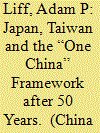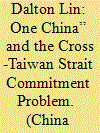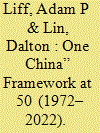| Srl | Item |
| 1 |
ID:
189499


|
|
|
|
|
| Summary/Abstract |
This study analyses the “one China” framework's significance for Japan–Taiwan relations since Tokyo switched diplomatic recognition from Taipei to Beijing in 1972. Drawing on Chinese-, Japanese- and English-language sources, it examines developments since the breakthrough Japan–PRC normalization communiqué and the “Japan formula,” which enabled Tokyo to normalize relations – six years before Washington – without recognizing Beijing's claim of sovereignty over Taiwan, and while maintaining robust, if unofficial, ties with Taipei thenceforth. Highlighting distinctions between Beijing's self-asserted “one-China principle” and Japan's ambiguous official position and subsequent effective policies, it assesses incremental but practically significant evolutions of Japan–Taiwan relations over the past half-century. In the 21st century, the trend towards incrementally closer ties has proven strikingly resilient to political transitions in Japan and Taiwan, China's growing power, pushback from Beijing and worsening cross-Strait frictions. Beyond Japan–Taiwan relations and theoretical debates on “one China,” this article's findings carry significant implications for Taiwan's international space, cross-Strait dynamics and China–Japan–United States relations.
|
|
|
|
|
|
|
|
|
|
|
|
|
|
|
|
| 2 |
ID:
189500


|
|
|
|
|
| Summary/Abstract |
Fifty years after the current “one China” framework emerged in international politics, the cross-Taiwan Strait “one China” dispute has transformed from its historical nature of indivisible sovereignty. As Taipei has stopped competing internationally to represent “China” since 1991, Beijing now worries that compromising its “one-China principle” in cross-Strait reconciliation would enhance Taiwan's separate statehood internationally and enable the island to push towards de jure independence. In contrast, Taipei worries that any perceived concessions on the question of “one China” would enhance China's sovereignty claim over Taiwan and enable Beijing to push for unification coercively with fewer concerns about international backlash. Improved cross-Strait relations thus rely on circumventing this quintessential commitment problem in international politics.
|
|
|
|
|
|
|
|
|
|
|
|
|
|
|
|
| 3 |
ID:
189495


|
|
|
|
|
| Summary/Abstract |
This lead article surveys the history and evolving policy legacies of the “one China” framework 50 years after US President Richard Nixon's historic 1972 visit to China. It begins by introducing key concepts and highlighting the crucial difference between Beijing's self-defined “one-China principle” and the US's, Japan's and key other countries’ variable “one China” policies as it relates to Taiwan. It argues that three seminal 1970s developments consolidated the “one China” framework as an informal institution of international politics. The ambiguity baked in by Cold War-era geopolitical necessity provided flexibility sufficient to enable diplomatic breakthroughs between erstwhile adversaries, but also planted seeds for deepening contestation and frictions today. Recent developments – especially Taiwan's democratization and Beijing's increasingly bold and proactive assertion of its claim to sovereignty over Taiwan – have transformed incentive structures in Taipei and for its major international partners. The net effect is that the myth of “consensus” and the ambiguities enabling the framework's half-century of success face unprecedented challenges today.
|
|
|
|
|
|
|
|
|
|
|
|
|
|
|
|